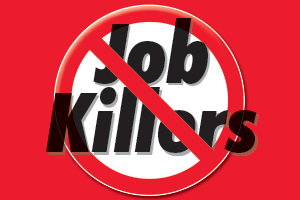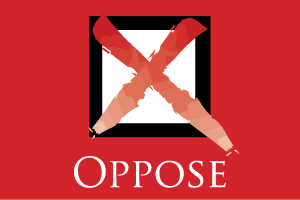 A bill that will impose a massive retroactive tax increase on California’s small businesses and taxpayers has been added to the California Chamber of Commerce Job Killer List.
A bill that will impose a massive retroactive tax increase on California’s small businesses and taxpayers has been added to the California Chamber of Commerce Job Killer List.
AB 1253 (Santiago; D-Los Angeles) seeks to increase California’s personal income tax rate, already the highest in the country, for struggling small businesses and high-income earners, which will result in a recently reported $6.8 billion in increased taxes.
Millions of California small businesses pay the personal income tax, and will soon face higher pandemic-related unemployment insurance taxes, workers’ compensation rates, and other new state-mandated costs of doing business. Imposing a punitive new tax on these businesses is exactly the opposite approach to saving jobs and restoring the state’s battered economy.
Income Tax Surcharge
Specifically, AB 1253 would retroactively increase taxes on small businesses and high-income earners by imposing an income tax surcharge in the following amounts:
- 1% on taxable income over $1 million but under $2 million;
- 3% on taxable income over $2 million but under $5 million; and
- 3.5% on taxable income over $5 million.
Currently, the highest state tax rate for individuals and sole proprietors is 13.3%. If AB 1253 were enacted, the 13.3% rate would rise to 14.3% for incomes above $1 million and the state’s highest rate would be raised to 16.8% for incomes above $5 million. As recently reported, this is an estimated $6.8 billion tax increase for Californians who already pay the highest state income taxes in the country.
AB 1253 and Prop. 15 Would Be the Largest Tax Increase in State History
During times of economic prosperity AB 1253 would be a job killer. During this time of economic crisis, AB 1253 is catastrophic. While the proposed tax hike is startling in its own right, examining it in the context of current affairs lends credence to the sentiment.
Proposition 15 has qualified for the November ballot and aims to repeal many of Proposition 13’s protections and increase taxes on California’s business properties — hurting many of the same businesses as those impacted by AB 1253.
According to the California Legislative Analyst, Proposition 15 will increase business property taxes by $7.5 billion to $12 billion a year, which would be the largest tax increase in California’s history. In the event Proposition 15 passes and AB 1253 is signed into law, Californians would experience a $13 billion to $18 billion tax increase.
Additionally, in June, Governor Gavin Newsom signed budget tax increases, primarily on businesses, totaling about $8.7 billion over the next three years. The bulk of these tax increases comprise a three-year suspension of the net operating loss deduction and $5 million-per-year limit on utilization of tax credits.
Depresses Business Growth
California already has the highest income tax rate in the country while Alaska, Florida, Nevada, South Dakota, Texas, Washington, and Wyoming do not impose any income tax.
In 2016, the top 1% of California income earners paid 46% of the total personal income tax revenue, and the top 5% accounted for 66.6% of the total revenue. The taxpayers who make up this bracket will likely have a long, thoughtful pause as to where they intend to reside and operate business should AB 1253 become the law. Losing any of these taxpayers and the revenue they contribute to the state could further harm California’s general fund.
AB 1253 also would degrade California’s economic competitiveness against other states who notoriously compete to attract California’s companies by providing tax benefits and other incentives to support businesses.
At a time when the state and country are in an economic free-fall, AB 1253 would hurt California businesses, employees and consumers and encourage residents to leave this state, along with their tax revenue.
The bill will depress business growth and state revenue in California and amplify an already-historic crisis.
Staff Contact: Preston Young


